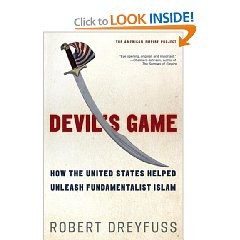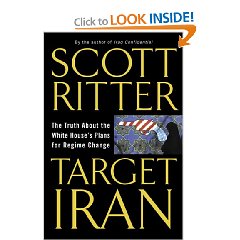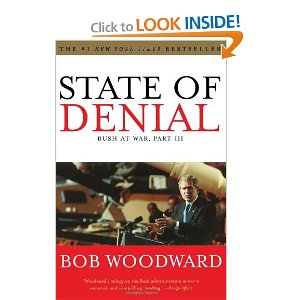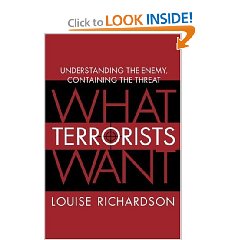
Complements Web of Deceit
June 21, 2007
Robert Dreyfuss
Robert Dreyfuss interviewed me once, for a piece in WIRED or Mother Jones, and I remember him as a serious, methodical person. It is no surprise to find him producing this meticulously documented and objectively constructed history, a perfect complement to Web of Deceit: The History of Western Complicity in Iraq, from Churchill to Kennedy to George W. Bush, on whose Amazon page I have a more detailed review of the overall topic.
The author captures the essence in his own introduction: the US was so focused on anti-communism and anti-Soviet campaigns that it deliberately chose to sponsor extreme rightist Islamic fundamentalists, fascists in their own way as the extreme right in America is today (see American Fascists: The Christian Right and the War On America).
The author is very specific in addressing how the US feared “nationalism, humanism, secularism, socialism” in its obsession with countering the Soviets, and so it chose to aid Islamic fundamentalists who opposed those more rational and publicly-oriented altneratives. In essence, the premise of the invasion of Iraq, that we are doing it to spread democracy, is yet another big lie–we have been denying democracy to the Arabs every since Roosevelt met with the Saudi king and formed a pact with the devil himself.
I totally agree with the author as he documents and sums up his own view that “A war on terrorism is precisely the wrong way to deal with the challenge posed by political Islam.”
The author offers four prescriptions for US action, and at the end here I list some relevant books that provide a broader context:
1) Remove the grievances–US troops in Saudi Arabia and Iraq, support for Israel's genocide against the Palestinians, support for Israel's plans to attack Iran
2) Abandon imperial pretentions in the Middle East
3) Refrain from seeking to impose preferences–political, economic, cultural, or religious, on the region
4) Stop making bellicose threats against Islamic nations from Iran to Sudan (and I would add, to Algeria, Morocco, Nigeria, and others)
I am reminded by this book of the common sense prescriptions in Imperial Hubris: Why the West is Losing the War on Terror. The raw fact is that the global literature is coming around to three points of view that are inter-related:
1) Bin Laden is largely right and on firm grounds in taking on both the debauched Saudi regime and the amoral unilaterally invasive US
2) Dick Cheney has committed so many high crimes and misdemeanors, with similar high crimes at the operational level (warrantless wiretapping on Americans, rendition and torture of all others) that America has lost all moral legitimacy both at home and abroad
3) We have the wrong global strategy, indeed we have no global strategy–we are trying to put out a forest fire with a hammer.
Some of the reviewers jump to conclusions, for example, the CIA was NOT really trying to ramp up the war in Afghanistan, until Congressman Charlie Wilson made it his personal vendetta. There is a much larger context within which American incompletence at world affairs can be judged, and it includes the shortcomings of the US educational system, the corruption of the US electoral system, and the grotesque dysfunctionality of the “winner take all” US system of governance. I hope some of the books below–or at least my reviews of them–will provide addtional context for this excellent work. See Web of Deceit for detailed comments I choose not to repeat here–the two books are a good combination with some overlap.
The American Empire Project has produced some really first-rate books on their chosen theme, and for this they are to be praised.
Charlie Wilson's War: The Extraordinary Story of How the Wildest Man in Congress and a Rogue CIA Agent Changed the History of Our Times
The Black Tulip: A Novel of War in Afghanistan
Wilson's Ghost: Reducing the Risk of Conflict, Killing, and Catastrophe in the 21st Century
Resource Wars: The New Landscape of Global Conflict With a New Introduction by the Author
Breaking the Real Axis of Evil: How to Oust the World's Last Dictators by 2025
The Unconquerable World: Power, Nonviolence, and the Will of the People
The Sorrows of Empire: Militarism, Secrecy, and the End of the Republic (The American Empire Project)











